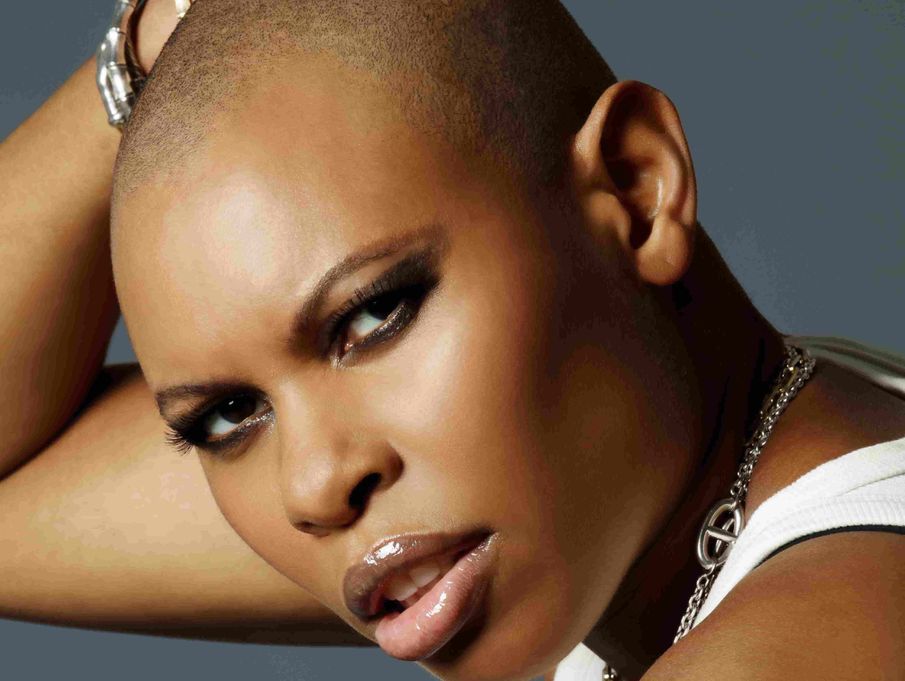Skin, lead singer of Skunk Anansie, DJ and author of It Takes Blood and Guts, joins Happiful’s podcast to talk about her memoir and blazing a phenomenal trail throughout her life to date
Skin is sitting in her New York home when we speak for Happiful’s podcast I am. I have. It’s mid-morning in the Big Apple and the sounds of the street weave their way into and around our conversation, as we discuss everything from coping with lockdown, to race and recognition within the British music industry.
Skin exudes a deep passion for music throughout our conversation, listing forgotten or underrated bands, and when she speaks about the experiences she encountered as a gay Black woman and artist in the nineties, she’s reflective but resolute about the changes that needed to, and continue to need to, happen.
We’re chatting ahead of her broadcast appearance this week at the Southbank Centre (4-11 March and on demand for 7 days), an event focussing around her memoir and experiences she’s shared within its pages. The title, It Takes Blood and Guts, references a song from Skunk Anansie’s acclaimed debut album Paranoid and Sunburnt and also the huge amount the band, and Skin personally, has achieved as well as the intense journey they’ve been on to reach such epic levels of success.
Skin’s memoir evolved through a series of events, starting when long-time friend and co-author of the book Lucy O’Brien suggested that they write an account of Skin’s life and career to date. Skin was initially dismissive.
“I went to see the Tina Turner musical at the theatre and I loved it, and Lucy said ‘Why don’t you write a book?’ and I said ‘Don’t be silly, I haven’t done anything!’” she shares. “But that seed went to the back of my head and it kept growing. Then a few books came out about the nineties, and then another book about Britpop and another book about Britpop and it just kind of struck me how we’re so used to our stories not being told, that we just get used to it.”
None of these stories were about a Black rock female from Brixton, so it was time to tell my story...
Skin explains that there was a lot of incredible music being made in the nineties but these sounds and groups, including Skunk Anansie, were being left out of music history and she wanted to address this. “None of these stories were about a Black rock female from Brixton, so it was time to tell my story and not be so typically British about it and remain in the background.”
The process of writing her memoir helped Skin to recall the phenomenal amount she’d achieved, including headlining at Glastonbury in the late nineties.
Skunk Anansie played their first set at the legendary Glastonbury festival in 1995 and then headlined on the Pyramid Stage in 1999. Skin was the first Black British woman to headline, a fact that was ‘forgotten’ by the press when Beyonce played in 2011, and when Stormzy was thought to be the first Black British artist to perform in 2019.
“Every Black person who plays Glastonbury seems to be told that they’re the first. I wasn’t told that in the nineties. In those days we were living in a much more racist society where you weren’t supposed to talk about race and make a big deal over it, because that wasn’t cool.”
Skin sent Stormzy a message congratulating him on his performance pointing out that she was the first Black British artist to headline 20 years beforehand, to which he responded sharing apologies and massive respect. The exchange inspired her to continue to speak up and tell her story. “There’s been so few people in that position and I feel like unless I start shouting about it, no-one is going to do that for me.”
We’re a band that are really trailblazing, on lots of different levels, and we’re still one of the biggest English bands to play outside of Europe
The rewriting of recent musical history, she shares, is reflective of a deeper issue. “There’s certain elements of society where the way that their racism plays out, is they just don't talk about you and then you cease to exist. And I think that worked out very comfortably for a lot of people for Skunk Anansie.
“We’re a band that are really trailblazing, on lots of different levels, and we’re still one of the biggest English bands to play outside of Europe. We still play to thousands and thousands of people - but the British press doesn’t talk about us, because they’d rather talk about Britpop.”
As well as speaking up about Skunk Anansie’s work, Skin uses her show on Absolute Radio to celebrate other amazing Black artists, recently interviewing Joan Armatrading. “She was internationally successful but that doesn’t get talked about. So after that interview, I just thought I’m going to big up Joan Armatrading and Tracey Chapman and all of these amazing people that no-one seems to talk about anymore. Because unless we do it, we just disappear,” she shares.
Continuing to blaze a trail and share her story is still very much where Skin’s focus is - and rightly so. “If I want my Black story to be told, then I have to tell it,” she explains.
“It comes with getting to the age of 50 and becoming, in some ways, a bit of an elder statesman and realising that there’s not enough of us. So we need to speak up.”
Listen to Skin’s full episode of I am. I have.
Skin at the Southbank Centre (4-11 March).
It Takes Blood and Guts - by Skin and Lucy O’Brien.
Follow Skin on Instagram.
Hear Skin on Absolute Radio.
Image: Marco Ovando
Find the right therapist for you at Counselling Directory


Comments